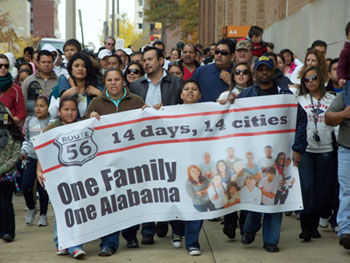

Vol. 75/No. 43 November 28, 2011

|
| Militant/Sam Manuel |
| November 12 protest in Birmingham, Ala., against anti-immigrant law. In middle is José Antonio Castro of La Jefa radio station; Anthony Johnson of NAACP is at right holding banner. |
In Birmingham, the day’s activities began by placing flowers on the grave of Fred Shuttlesworth and a march to Kelly Ingram Park, an historic site marking the 1963 battle against Jim Crow racial segregation of which Shuttlesworth was a central leader.
“We are here in this very important site of the struggle for human rights and justice,” said José Antonio Castro, program director for La Jefa, a popular Spanish-language radio station throughout the state. Castro, along with radio announcer Orlando Rosa, arrived in the city that is the seventh stop in their “14 days, 14 cities” walk to campaign for the repeal of the “Alabama Taxpayer and Citizen Protection Act.”
Known as HB 56, the act, like recent laws in Arizona, Georgia and other states, builds on existing federal law. Its provisions include instructing police to “determine the citizenship and immigration status” of anyone they stop and banning many contracts and business transactions with undocumented immigrants, including rental and home ownership agreements.
One aspect of the legislation requiring schools to determine if each student is a legal U.S. resident “or is the child of an alien not lawfully present” was temporarily blocked by a federal court.
“Whatever happens we must continue to fight for our rights,” Celso Rivera, a construction worker on the march, told the rally. Rivera said he was six months into paying for a house when the bill was passed. He has had to stop payments and lost what he had already paid. His two children are afraid to attend school.
“Jim Crow may be dead but his cousins are very much alive,” said Anthony Johnson to the crowd’s applause. Johnson spoke on behalf of the Birmingham National Association for the Advancement of Colored People. “Your battle today is part of the battle to continue the fight for civil rights.” Johnson led rally participants on a walking tour of the park’s plaza, which also includes the 16th Street Baptist Church and the Birmingham Civil Rights Institute.
On Sept. 15, 1963, during Sunday service, a bomb exploded at the church, killing four young Black girls. Twenty-three other people were also hurt in the blast.
At the entrance to the civil rights institute Castro was approached by several workers who had attended the rally. One of them explained that the fight against HB 56 is very difficult because many people don’t have papers.
Castro responded that when young Blacks attempted to enter restaurants and other places that were segregated the law was against them. “The law is the law. Like those young people did, we must also confront it,” said Castro.
The “14 Days, 14 Cities” tour started in Athens. Next was Huntsville, followed by Cullman, Albertville, Oneonta and Gardendale. After Birmingham will be Tuscaloosa, Centreville, Clanton, Selma, Prattville and Wetumpka. The tour ends November 19 with a rally in Montgomery, the state capital.
A rally is also planned November 21 here at the 16th Street Baptist Church. Among the announced speakers are Democratic Congress members Terri Sewell, John Lewis and Luis Gutierrez; Rev. Arthur Price Jr., the church’s pastor; Bernard Simelton, president of the Alabama NAACP; Hillary Shelton, director of NAACP, Washington bureau; and Mitch Ackerman, executive vice president of the Service Employees International Union.
Front page (for this issue) |
Home |
Text-version home